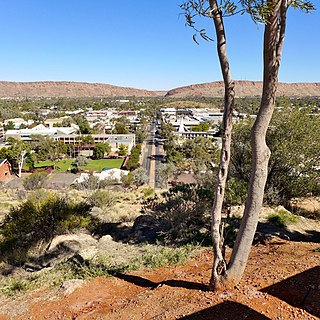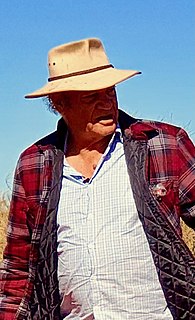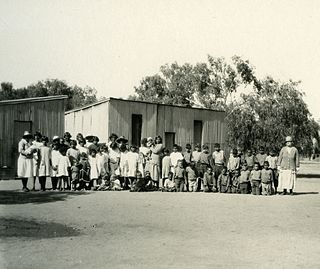Related Research Articles

The Northern Territory is an Australian territory in the central and central northern regions of Australia. The Northern Territory shares its borders with Western Australia to the west, South Australia to the south, and Queensland to the east. To the north, the territory looks out to the Timor Sea, the Arafura Sea and the Gulf of Carpentaria, including Western New Guinea and other islands of the Indonesian archipelago.

Alice Springs is the third-largest town in the Northern Territory of Australia. Known as Stuart until 31 August 1933, the name Alice Springs was given by surveyor William Whitfield Mills after Alice, Lady Todd, wife of the telegraph pioneer Sir Charles Todd. Known colloquially as 'The Alice' or simply 'Alice', the town is situated roughly in Australia's geographic centre. It is nearly equidistant from Adelaide and Darwin.
The Central Australian Aboriginal Media Association (CAAMA) is an organisation founded in 1980 to expose Aboriginal music and culture to the rest of Australia. Based in Alice Springs, the organisation is particularly focused on the involvement of the local Indigenous community in its production. CAAMA is involved in radio, television and recorded music.

Indigenous music of Australia comprises the music of the Aboriginal and Torres Strait Islander peoples of Australia, intersecting with their cultural and ceremonial observances, through the millennia of their individual and collective histories to the present day. The traditional forms include many aspects of performance and musical instrumentation that are unique to particular regions or Aboriginal Australian groups; and some elements of musical tradition are common or widespread through much of the Australian continent, and even beyond. The music of the Torres Strait Islanders is related to that of adjacent parts of New Guinea. Music is a vital part of Indigenous Australians' cultural maintenance.
Warumpi Band were an Australian country and Aboriginal rock group which formed in the outback settlement of Papunya, Northern Territory, in 1980. The original line-up was George Burarrwanga on vocals and didgeridoo, Gordon Butcher Tjapanangka on drums, his brother Sammy Butcher Tjapanangka on guitar and bass guitar, and Neil Murray on rhythm guitar and backing vocals. Their songs are in English, Luritja and Gumatj. Their key singles are "Jailanguru Pakarnu" (1983), "Blackfella/Whitefella" (1985), "Sit Down Money" (1986), "My Island Home" (1987) and "No Fear" (1987). The group released three albums, Big Name, No Blankets (1985), Go Bush! (1987) and Too Much Humbug (1996). From late 1987 to mid-1995 the group rarely performed as Murray focused on his solo career. In early 1995, Christine Anu, issued a cover version of "My Island Home". Warumpi Band regrouped before disbanding in 2000. Burarrwanga died on 10 June 2007 of lung cancer.
Imparja Television (IMP) is an independent Australian television station servicing over 3,600,000 km2 (1,400,000 sq mi), across six states and territories: Northern Territory, South Australia, Tasmania, Queensland, New South Wales and Victoria. It is based in Alice Springs, and is controlled by Aboriginal people through ownership by Imparja Television Pty Ltd.
Reggae is a music genre that originated in Jamaica in the late 1960s. Australia has several bands and sound systems that play reggae music in a style faithful to its expression in Jamaica. Australia has a relatively small Jamaican community, but reggae penetrated local consciousness via the popularity of reggae among the non-Jamaican population of England in the 1960s and 1970s. Many indigenous musicians have embraced reggae, both for its musical qualities and its ethos of resistance. Examples include Mantaka, No Fixed Address, Zennith and Coloured Stone.
Robert James "Bob" Randall was an Aboriginal Australian elder, singer and community leader. He was a member of the Stolen Generations and became an elder of the Yankunytjatjara people from Central Australia. He was the 1999 NAIDOC Person of the Year. His 1970 song, "My Brown Skin Baby, They Take 'Im Away," is described as an "anthem" for the Stolen Generations. He was known by the honorific "Tjilpi", a word meaning "old man" that is often translated as "uncle". He lived in Mutitjulu, the Aboriginal community at Uluru in the Northern Territory of Australia.
Warren Hedley Williams is an Aboriginal singer, musician and songwriter from Hermannsburg in Central Australia. Williams is an Arrernte man who plays country music and works as a broadcaster on CAAMA Radio in Alice Springs He started playing guitar at six with his father Gus Williams.
Trevor Adamson is a country/gospel singer best known for his song Nyanpi Matilda, a Pitjantjatjara version of Waltzing Matilda. He is from Pukatja, South Australia and sings in both Pitjantjatjara and English. He was the subject of an episode of an ABC TV series, Six Australians. Trevor Adamson also featured in episode #1008 of the NITV show "Pmarra Country", an Aboriginal tribute to the legendary Slim Dusty, in which Mr. Adamson performed his Pitjantjatjara language version of Slim Dusty's 1972 song "When the Rain Tumbles Down in July".

Isaac Yamma was a country singer from Central Australia. He was a Pitjantjatjara man who was born by a waterhole near Docker River (Kaltukatjara). He started his musical career as a member of Areyonga Desert Tigers. He later performed with his band the Pitjantjatjara Country Band, a band made up of his sons Hector, Frank, Peter and Paul and his cousin Russell Yamma. His song were mostly sung in Pitjantjatjara. He was also a radio host on CAAMA Radio 8KIN FM.

Vincent Forrester is an Aboriginal Australian activist, artist and community leader. Forrester was a founding member of a number of Aboriginal organisations in central Australia. He lives at Mutitjulu, where he has served as the chairman of the community council. During the 1980s, he served as an advisor on indigenous affairs to the governments of Malcolm Fraser and Bob Hawke.

The Bungalow was an institution for Aboriginal children established in 1914 in Alice Springs in the Northern Territory of Australia. It existed at several locations in Alice Springs, Jay Creek and the Alice Springs Telegraph Station.
Priscilla Collins is a prominent Aboriginal leader, advocate and television producer. Collins is currently the Chief Executive Officer of the North Australian Aboriginal Justice Agency (NAAJA), the largest law firm in the Northern Territory of Australia.
Freda Glynn OAM is a Kaytetye photographer and media specialist, who co-founded the Central Australian Aboriginal Media Association Group of Companies; which incorporates CAAMA and Imparja.
Simon Rieff was one of the first miners to open up The Granites goldfield in the Northern Territory of Australia before moving to Alice Springs to become a property developer and business man.
Stuart Joel Nuggett (Kirriyangunji) is a Jingili country musician based in Alice Springs, Australia. He speaks Mudbura and Jingulu languages.
Danielle MacLean is an Australian filmmaker. She is known for her writing on television series such as Little J & Big Cuz, 8MMM Aboriginal Radio and Redfern Now.
Steven McGregor is an Australian filmmaker, known for his work on Redfern Now, Black Comedy, Sweet Country, and numerous documentaries, including My Brother Vinnie.
References
- 1 2 3 4 Lee, Nicole (12 February 2007). "Born in the Todd". abc.net.au. Retrieved 8 November 2019.
- ↑ ABC - Stateline Indigenous Music Awards
- ↑ Alice Spring News COUNTRY MUSIC TRIBUTE. Report by DOROTHY GRIMM.